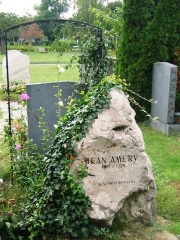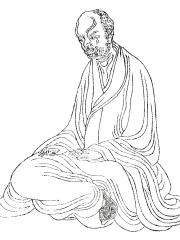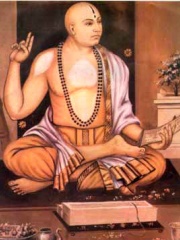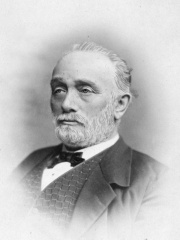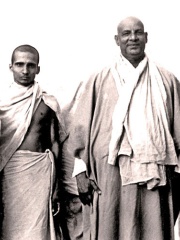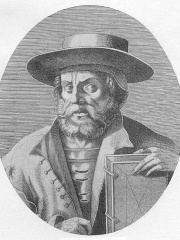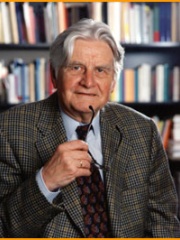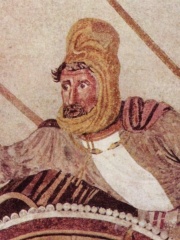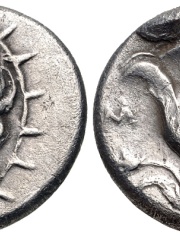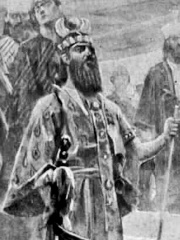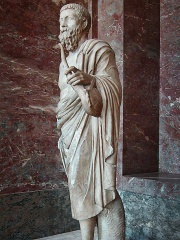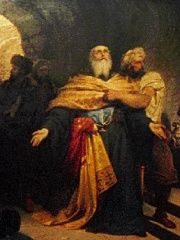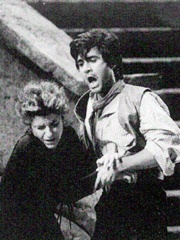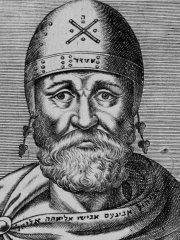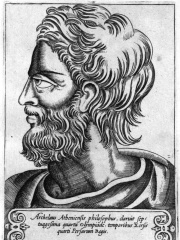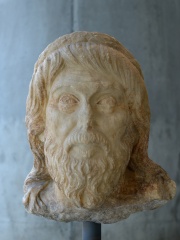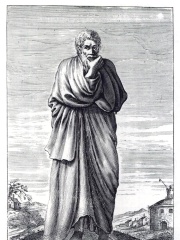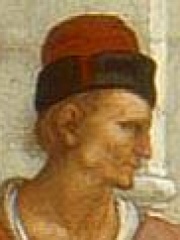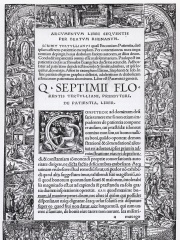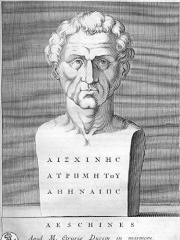Philosopher
Anaxarchus
380 BC - 320 BC
EN.WIKIPEDIA PAGE VIEWS (PV)
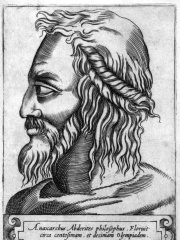
 Anaxarchus
Anaxarchus
Anaxarchus (; Greek: Ἀνάξαρχος; c. 380 – c. 320 BC) was a Greek philosopher of the school of Democritus. Together with Pyrrho, he accompanied Alexander the Great into Asia. Read more on Wikipedia
His biography is available in 29 different languages on Wikipedia (up from 28 in 2024). Anaxarchus is the 525th most popular philosopher (down from 489th in 2024), the 319th most popular biography from Greece (down from 299th in 2019) and the 39th most popular Greek Philosopher.
Memorability Metrics
Page views of Anaxarchus by language
Among Philosophers
Among philosophers, Anaxarchus ranks 525 out of 1,267. Before him are Jean Améry, Karl Löwith, Huiyuan, Giles of Rome, Madhvacharya, and Ludwig Büchner. After him are Sivananda Saraswati, Manuel Chrysoloras, Charles Taylor, Saul Kripke, Karl-Otto Apel, and Polemon.
Most Popular Philosophers in Wikipedia
Go to all RankingsJean Améry
1912 - 1978
HPI: 65.87
Rank: 519
Karl Löwith
1897 - 1973
HPI: 65.87
Rank: 520
Huiyuan
334 - 416
HPI: 65.87
Rank: 521
Giles of Rome
1243 - 1316
HPI: 65.84
Rank: 522
Madhvacharya
1199 - 1278
HPI: 65.81
Rank: 523
Ludwig Büchner
1824 - 1899
HPI: 65.80
Rank: 524
Anaxarchus
380 BC - 320 BC
HPI: 65.78
Rank: 525
Sivananda Saraswati
1887 - 1963
HPI: 65.75
Rank: 526
Manuel Chrysoloras
1355 - 1415
HPI: 65.74
Rank: 527
Charles Taylor
1931 - Present
HPI: 65.69
Rank: 528
Saul Kripke
1940 - 2022
HPI: 65.68
Rank: 529
Karl-Otto Apel
1922 - 2017
HPI: 65.66
Rank: 530
Polemon
400 BC - 270 BC
HPI: 65.65
Rank: 531
Contemporaries
Among people born in 380 BC, Anaxarchus ranks 5. Before him are Darius III, Pytheas, Memnon of Rhodes, and Oxyartes. After him are Demades, Anaximenes of Lampsacus, Mentor of Rhodes, and Lanike. Among people deceased in 320 BC, Anaxarchus ranks 2. Before him is Theopompus. After him are Zoilus, Anaximenes of Lampsacus, and Dinostratus.
Others Born in 380 BC
Go to all RankingsDarius III
POLITICIAN
380 BC - 330 BC
HPI: 81.71
Rank: 1
Pytheas
EXPLORER
380 BC - 310 BC
HPI: 74.06
Rank: 2
Memnon of Rhodes
NOBLEMAN
380 BC - 333 BC
HPI: 68.39
Rank: 3
Oxyartes
POLITICIAN
380 BC - 400 BC
HPI: 65.97
Rank: 4
Anaxarchus
PHILOSOPHER
380 BC - 320 BC
HPI: 65.78
Rank: 5
Demades
POLITICIAN
380 BC - 317 BC
HPI: 63.41
Rank: 6
Anaximenes of Lampsacus
POLITICIAN
380 BC - 320 BC
HPI: 63.34
Rank: 7
Mentor of Rhodes
SOCIAL ACTIVIST
380 BC - 340 BC
HPI: 59.44
Rank: 8
Lanike
NOBLEMAN
380 BC - 339 BC
HPI: 53.76
Rank: 9
Others Deceased in 320 BC
Go to all RankingsTheopompus
HISTORIAN
400 BC - 320 BC
HPI: 69.44
Rank: 1
Anaxarchus
PHILOSOPHER
380 BC - 320 BC
HPI: 65.78
Rank: 2
Zoilus
PHILOSOPHER
400 BC - 320 BC
HPI: 64.73
Rank: 3
Anaximenes of Lampsacus
POLITICIAN
380 BC - 320 BC
HPI: 63.34
Rank: 4
Dinostratus
MATHEMATICIAN
390 BC - 320 BC
HPI: 58.29
Rank: 5
In Greece
Among people born in Greece, Anaxarchus ranks 319 out of NaN. Before him are Ageladas (-600), Cleisthenes of Sicyon (-701), Aristyllus (-400), Cylon of Athens (-700), Yanni (1954), and Semonides of Amorgos (-650). After him are Lais of Corinth (-400), Polemon (-400), Gregory V of Constantinople (1745), Agnes Baltsa (1944), Hierocles of Alexandria (410), and Cynisca (-430).
Others born in Greece
Go to all RankingsAgeladas
SCULPTOR
600 BC - 500 BC
HPI: 65.98
Rank: 313
Cleisthenes of Sicyon
POLITICIAN
701 BC - 600 BC
HPI: 65.95
Rank: 314
Aristyllus
MATHEMATICIAN
400 BC - 300 BC
HPI: 65.94
Rank: 315
Cylon of Athens
POLITICIAN
700 BC - 700 BC
HPI: 65.93
Rank: 316
Yanni
MUSICIAN
1954 - Present
HPI: 65.88
Rank: 317
Semonides of Amorgos
WRITER
650 BC - 550 BC
HPI: 65.80
Rank: 318
Anaxarchus
PHILOSOPHER
380 BC - 320 BC
HPI: 65.78
Rank: 319
Lais of Corinth
POLITICIAN
400 BC - 360 BC
HPI: 65.75
Rank: 320
Polemon
PHILOSOPHER
400 BC - 270 BC
HPI: 65.65
Rank: 321
Gregory V of Constantinople
RELIGIOUS FIGURE
1745 - 1821
HPI: 65.64
Rank: 322
Agnes Baltsa
SINGER
1944 - Present
HPI: 65.63
Rank: 323
Hierocles of Alexandria
WRITER
410 - 500
HPI: 65.58
Rank: 324
Cynisca
POLITICIAN
430 BC - 389 BC
HPI: 65.57
Rank: 325
Among Philosophers In Greece
Among philosophers born in Greece, Anaxarchus ranks 39. Before him are Philo of Larissa (-145), Archelaus (-500), Plutarch of Athens (350), Timon of Phlius (-320), Eudemus of Rhodes (-370), and Phaedo of Elis (-401). After him are Polemon (-400), Crates of Athens (-400), Nicos Poulantzas (1936), Zoilus (-400), Cebes (-500), and Aeschines of Sphettus (-430).
Philo of Larissa
145 BC - 79 BC
HPI: 68.58
Rank: 33
Archelaus
500 BC - 430 BC
HPI: 68.42
Rank: 34
Plutarch of Athens
350 - 431
HPI: 68.19
Rank: 35
Timon of Phlius
320 BC - 230 BC
HPI: 67.63
Rank: 36
Eudemus of Rhodes
370 BC - 300 BC
HPI: 67.42
Rank: 37
Phaedo of Elis
401 BC - 400 BC
HPI: 67.17
Rank: 38
Anaxarchus
380 BC - 320 BC
HPI: 65.78
Rank: 39
Polemon
400 BC - 270 BC
HPI: 65.65
Rank: 40
Crates of Athens
400 BC - 268 BC
HPI: 65.54
Rank: 41
Nicos Poulantzas
1936 - 1979
HPI: 64.93
Rank: 42
Zoilus
400 BC - 320 BC
HPI: 64.73
Rank: 43
Cebes
500 BC - 400 BC
HPI: 64.47
Rank: 44
Aeschines of Sphettus
430 BC - 360 BC
HPI: 64.46
Rank: 45
